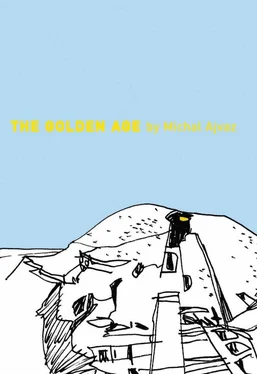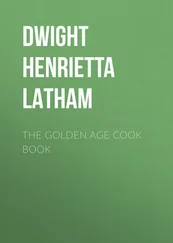Michal Ajvaz - The Golden Age
Здесь есть возможность читать онлайн «Michal Ajvaz - The Golden Age» весь текст электронной книги совершенно бесплатно (целиком полную версию без сокращений). В некоторых случаях можно слушать аудио, скачать через торрент в формате fb2 и присутствует краткое содержание. Год выпуска: 2010, Издательство: Dalkey Archive Press, Жанр: Современная проза, на английском языке. Описание произведения, (предисловие) а так же отзывы посетителей доступны на портале библиотеки ЛибКат.
- Название:The Golden Age
- Автор:
- Издательство:Dalkey Archive Press
- Жанр:
- Год:2010
- ISBN:нет данных
- Рейтинг книги:4 / 5. Голосов: 1
-
Избранное:Добавить в избранное
- Отзывы:
-
Ваша оценка:
- 80
- 1
- 2
- 3
- 4
- 5
The Golden Age: краткое содержание, описание и аннотация
Предлагаем к чтению аннотацию, описание, краткое содержание или предисловие (зависит от того, что написал сам автор книги «The Golden Age»). Если вы не нашли необходимую информацию о книге — напишите в комментариях, мы постараемся отыскать её.
is Michal Ajvaz’s greatest and most ambitious work.
The Golden Age
The Golden Age — читать онлайн бесплатно полную книгу (весь текст) целиком
Ниже представлен текст книги, разбитый по страницам. Система сохранения места последней прочитанной страницы, позволяет с удобством читать онлайн бесплатно книгу «The Golden Age», без необходимости каждый раз заново искать на чём Вы остановились. Поставьте закладку, и сможете в любой момент перейти на страницу, на которой закончили чтение.
Интервал:
Закладка:
After this the circles transformed themselves into eight-beamed stars, which went on to become an evenly-proportioned cross. This cross shone violet and its arms coiled themselves towards its centre before changing into four spirals. These then became entwined and began to form complicated, moving ornaments. Their movement was the result of the meshing of the real motion of the snails and the illusory motion born out of the perfect harmonization of the changes in colour. (Imagine a billboard on which moving pictures arise not only from the lighting-up of individual points, as is common, but also from the real movement of these points.)
After these games, which take the whole night, the snails return to the sea and there begin to grow new shells. On the shore they leave behind enough shells to stock the islanders’ stores until the next snail-courtship ritual is played out. It is necessary to gather the shells while the gala of lights is still in progress and to immerse them immediately in a herbal marinade, for soon they harden and once they are hard there is nothing one can do with them. This is why the islanders move carefully among the dancing snails, walking on tiptoe and collecting the cast-off shells, as if complementing the snails’ ballet with a dance of their own. I remember how I got to know Karael after my first snail festival. It was a month after my arrival; I knew no one on the island and was living on the very edge of the lower town in an empty house whose windows — every one of them — had a view of the sandy flats. When one night the dark plain was lit up by a moving pattern of lights, among which ever-changing figures were dancing on the tips of black shadows, I had not the slightest idea what was going on. I just stood there at the window watching the dance of the lights and shadows. There was a moment when the crooked beams of the stars straightened and one of them reached the wall of my house; I looked on in amazement at the luminous animal beneath my window. This snail was glowing with a green light which reminded me of the neon of Prague. It was in this light that I first became aware of Karael, who was among those islanders gathering shells. Since my return from the island the pictures of Karael in my memory have been extinguished one after another (just as I have forgotten all her other names), so that now only this first picture remains. Whenever I write of Karael, the face that bobs up out of the dark is bathed in this green light.
The feast at which the ink of the cuttlefish and the shells are served has a strong element of ritual, and as such it is one of the things which was subject to least change in the course of my stay. From the time of my arrival on the island to my departure three years later, half of its alphabet changed and a new grammatical case appeared in its language, but the preparation of the stuffed shells continued in the old way. To begin with the shell is filled with a green jelly made from the leaves of a climbing plant which crawls over the walls of the inner courtyards of the lower town and enters apartments through their windows. In the middle of the night the flowers of this plant open themselves up to the night moths one after another, in so doing making a quiet sound like a finger brushing against the strings of a musical instrument. These tones of different pitches — stars in the realm of sound — are submerged in the chattering of the water. The leaves of the climbing plant are steeped in water and left to mature in the pantries for several weeks.
The shell — filled with a mix of leaves and berries and sealed with a resin — is laid in the centre of the table. Each of the guests chooses one of the prepared pieces of ink-fungus and uses a special spoon to scoop out its inside; this is the origin of the soft, pliant bowls (reminiscent of white rubber balls cut in half) the guests hold in their hands. Then everyone waits until the meal is ready. Someone tells a story to while away the time. The green jelly and fruit inside the shell ferment and work on the casing in such a way that it soon begins to soften, coming to resemble wrinkled skin. From within there is a muted gurgling. After an hour or so the process within the shell reaches its most turbulent phase; the gurgling is more urgent and the wrinkled shell swells so that its surface is so taut I was always afraid that the pressure applied from within would tear it open or that the covering of hardened resin would shoot off, injuring one of the guests. But the sides of the shell and its resinous lid are remarkably solid. A short while later small openings in the taut surface do indeed begin to appear, letting out a pink vapour and a hissing. The pink vapour forms itself into columns which look a bit like the spines of a porcupine, and it is this moment in the meal’s development which gives it its name.
The fumes which escape from the shell have a mildly intoxicating effect, which in my presence often caused the story one of the guests was telling to assume characteristics of the fantastic. I remember that Karael in particular was able to invent really good stories at such a feast. And she liked to plot her tales around books I had told her about. Once, for example, she wove this crazy tale out of Remembrance of Things Past, The Castle and Twenty Thousand Leagues under the Sea . The hero of the story, a young Parisian called Marcel, was on board an ocean-going steamship when in mysterious circumstances it was hit by a torpedo from a submarine and sunk. Marcel succeeded in swimming to the undersea vessel, which he was able to get inside of. The submarine was called the Nautilus , and in its spacious rooms the sailors and their officers lived with their families. The crew was commanded by the Duke of Guermantes, also known as Captain Nemo. Marcel took pains to work himself into the circle which had formed around the captain and his wife. The cabin boy Barnabas, whose job it was to establish contact between the senior officers and the new passenger, was not able to help him. The captain’s nephew Saint-Loup, whom Marcel befriended, was full of goodwill, but his efforts were no more productive than those of Barnabas; the company which gathered around the captain and his wife was a closed one. The captain’s brother Baron de Charlus, however, maintained a steadfast interest in Marcel; he took him for trips in his mini-submarine and invited him to join an exclusive society of seamen, whose members included famous submarine captains and senior officers.
Marcel fell in love with Albertine, the daughter of the Nautilus’s engineer and the lover of Klamm (one of the senior officers), whom she left in order to go to Marcel. The ties that bound Albertine to Klamm were strong, and for this reason Marcel did not trust her and was constantly suspicious of her; he had her followed and eventually held captive in her cabin…Once the intoxicating fumes began to work their effect, the story became more zany still. Karael described in detail Elstir’s seascape mosaics, which he composed from fragments of shell, and, most dramatically, Swann’s fight with a shark. Then the story slipped the shackles of the three books it had grown out of and sea monsters swept in with pointed spines on their backs and sagging jowls; in the end we were taken to great undersea cities populated by sluggish, apathetic demons.
Once the shell has given off its gas, it goes slack, the cracks in it close, and for about two hours its surface is still. Then the shell does nothing but give an occasional shudder, while from time to time a barely-audible rumbling and sighing comes from its inside. After that the shell again begins to swell up. At this point the storyteller falls silent and the guests gather around the table, on which the bowls of solidified white ink stand at the ready. Quite suddenly the openings reappear in the shell and vermilion geysers of juice spurt forth, which the guests catch in their bowls. Once the fountain desists, the guest sip this delicious liquid; among its dozens of flavours are discernible mango, smoked salmon, ginger, figs, lobster, pineapple and dill. While they drink, the guests nibble on their ink bowls. At the end of the feast the now-flat shell and its remnants of jelly and fruit are cut up and each of the guests is given a piece; this looks a little like apple strudel.
Читать дальшеИнтервал:
Закладка:
Похожие книги на «The Golden Age»
Представляем Вашему вниманию похожие книги на «The Golden Age» списком для выбора. Мы отобрали схожую по названию и смыслу литературу в надежде предоставить читателям больше вариантов отыскать новые, интересные, ещё непрочитанные произведения.
Обсуждение, отзывы о книге «The Golden Age» и просто собственные мнения читателей. Оставьте ваши комментарии, напишите, что Вы думаете о произведении, его смысле или главных героях. Укажите что конкретно понравилось, а что нет, и почему Вы так считаете.












